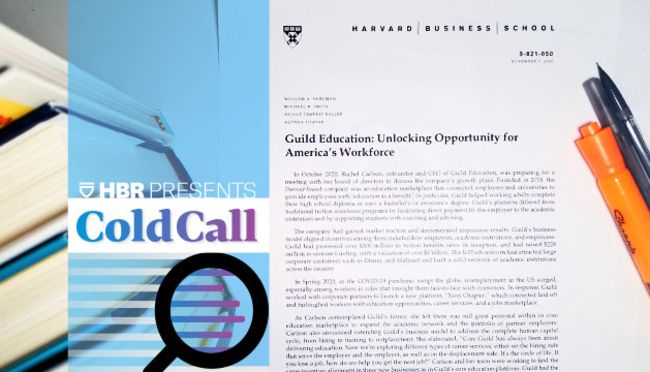Training →
→

- 16 Oct 2023
- HBS Case
Advancing Black Talent: From the Flight Ramp to 'Family-Sustaining' Careers at Delta
By emphasizing skills and expanding professional development opportunities, the airline is making strides toward recruiting and advancing Black employees. Case studies by Linda Hill offer an inside look at how Delta CEO Ed Bastian is creating a more equitable company and a stronger talent pipeline.

- 26 Jul 2023
- Research & Ideas
STEM Needs More Women. Recruiters Often Keep Them Out
Tech companies and programs turn to recruiters to find top-notch candidates, but gender bias can creep in long before women even apply, according to research by Jacqueline Ng Lane and colleagues. She highlights several tactics to make the process more equitable.

- 28 Feb 2023
- Research & Ideas
Can Apprenticeships Work in the US? Employers Seeking New Talent Pipelines Take Note
What if the conventional college-and-internship route doesn't give future employees the skills they need to build tomorrow's companies? Research by Joseph Fuller and colleagues illustrates the advantages that apprenticeships can provide to employees and young talent.

- 09 Aug 2021
- Research & Ideas
OneTen: Creating a New Pathway for Black Talent
A new organization aims to help 1 million Black Americans launch careers in the next decade, expanding the talent pool. Rawi E. Abdelal, Katherine Connolly Baden, and Boris Groysberg explain how. Open for comment; 0 Comments.

- 19 May 2021
- Op-Ed
Why America Needs a Better Bridge Between School and Career
As the COVID-19 pandemic wanes, America faces a critical opportunity to close gaps that leave many workers behind, say Joseph Fuller and Rachel Lipson. What will it take? Open for comment; 0 Comments.

- 23 Mar 2021
- Cold Call Podcast
Managing Future Growth at an Innovative Workforce Education Startup
Guild Education is an education marketplace that connects employers and universities to provide employees with “education as a benefit.” Now CEO and co-founder Rachel Carlson must decide how to manage the company’s future growth. Professor Bill Sahlman discusses this unique startup and Carlson’s plans for its growth in his case, “Guild Education: Unlocking Opportunity for America's Workforce.” Open for comment; 0 Comments.

- 06 Aug 2020
- Research & Ideas
Who Will Give You the Best Professional Guidance?
Even the most powerful leaders need support and guidance occasionally. Julia Austin offers advice own how and where to find the right type of mentor. Open for comment; 0 Comments.

- 27 Apr 2020
- Research & Ideas
How Remote Work Changes What We Think About Onboarding
COVID-19 has turned many companies into federations of remote workplaces, but without guidance on how their onboarding of new employees must change, says Boris Groysberg. Open for comment; 0 Comments.

- 07 Jul 2019
- HBS Case
Walmart's Workforce of the Future
A case study by William Kerr explores Walmart's plans for future workforce makeup and training, and its search for opportunities from digital infrastructure and automation. Open for comment; 0 Comments.

- 30 Jun 2019
- Working Paper Summaries
The Comprehensive Effects of Sales Force Management: A Dynamic Structural Analysis of Selection, Compensation, and Training
When sales forces are well managed, firms can induce greater performance from them. For this study, the authors collaborated with a major multinational firm to develop and estimate a dynamic structural model of sales employee responses to various management instruments like compensation, training, and recruiting/termination policies.

- 03 Apr 2019
- Working Paper Summaries
Learning or Playing? The Effect of Gamified Training on Performance
Games-based training is widely used to engage and motivate employees to learn, but research about its effectiveness has been scant. This study at a large professional services firm adopting a gamified training platform showed the training helps performance when employees are already highly engaged, and harms performance when they’re not.

- 02 Apr 2019
- Working Paper Summaries
Managerial Quality and Productivity Dynamics
Which managerial skills, traits, and practices matter most for productivity? This study of a large garment firm in India analyzes the integration of features of managerial quality into a production process characterized by learning by doing.

- 23 Jul 2018
- Working Paper Summaries
The Creative Consulting Company
Management theories cannot be tested in laboratories; they must be applied, tested, and extended in real organizations. For this reason the most creative consulting companies balance conflicting demands between short‐term business development and long‐term knowledge creation.
- 25 Jul 2016
- Research & Ideas
Who is to Blame for 'The Great Training Robbery'?
Companies spend billions annually training their executives, yet rarely realize all the benefit they could, argue Michael Beer and colleagues. He discusses a new research paper, The Great Training Robbery. Open for comment; 0 Comments.

- 19 Apr 2016
- Working Paper Summaries
The Great Training Robbery
There is a widely held assumption in corporate life that well trained, even inspired individuals can change the system. This article explains why training fails and discusses why the “great training robbery” persists. The authors offer a framework for integrating leadership and organization change and development, and discuss implications for the corporate HR function.
- 08 Sep 2015
- Research & Ideas
Knowledge Transfer: You Can't Learn Surgery By Watching
Learning to perform a job by watching others and copying their actions is not a great technique for corporate knowledge transfer. Christopher G. Myers suggests a better approach: Coactive vicarious learning. Open for comment; 0 Comments.
- 17 Oct 2011
- Research & Ideas
How ‘Hybrid’ Nonprofits Can Stay on Mission
As nonprofits add more for-profit elements to their business models, they can suffer mission drift. Associate Professor Julie Battilana says hybrid organizations can stay on target if they focus on two factors: the employees they hire and the way they socialize those employees. Key concepts include: In order to avoid mission drift, hybrid organizations need to focus on whom they hire and whether their employees are open to socialization. Because early socialization is so important, hybrid firms may be better off hiring new college graduates with no work background rather than a mix of seasoned bankers and social workers. The longer their tenure in a hybrid organization, the more likely top managers may be to hire junior people. Closed for comment; 0 Comments.

Cold Call: Building a More Equitable Culture at Delta Air Lines
In December 2020 Delta Air Lines CEO Ed Bastian and his leadership team were reviewing the decision to join the OneTen coalition, where he and 36 other CEOs committed to recruiting, hiring, training, and advancing one million Black Americans over the next ten years into family-sustaining jobs. But, how do you ensure everyone has equal access to opportunity within an organization? Professor Linda Hill discusses Delta’s decision and its progress in embedding a culture of diversity, equity, and inclusion in her case, “OneTen at Delta Air Lines: Catalyzing Family-Sustaining Careers for Black Talent.”